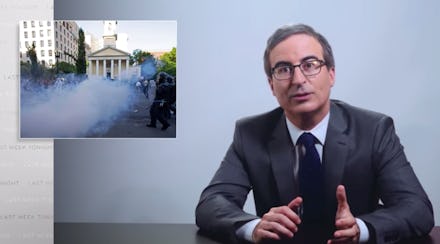John Oliver delivered the perfect argument for defunding the police

As demands to defund the police grow ever louder in the wake of the killing of George Floyd, John Oliver is urging us to take this possibility seriously. In a razor-sharp, poignant episode of Last Week Tonight, which aired on Sunday, he delved into policing’s white supremacist roots, the obstacles to reforming it, and what we can do moving forward.
After strongly criticizing the audacity of police officers responding with excessive force to peaceful protesters rallying against — well, excessive police force — Oliver stressed that we didn’t get here by accident. “It’s important to understand how deeply policing in this country is entangled with white supremacy,” he said.
Some of our first law enforcement units were slave patrols, he went on, responsible for capturing and returning runaway slaves. For a century afterward, police in the South enforced segregation and permitted lynching and anti-Black terrorism, and even engaged in it themselves. Black Americans migrated north only to meet police brutality yet again, compounded by redlining and other forms of systemic racism. Oliver then covered the war on drugs and zero tolerance policing, which led to stop-and-frisk policies that disproportionately target Black and Latinx people.
Oliver also dove into disturbingly powerful police unions, which “can make it incredibly difficult to discipline officers even for egregious misconduct,” through negotiating language into contracts and other methods. The federal government can respond to union resistance by investigating police departments for civil rights violations. They can enter into a consent decree, in which the police department agrees to institutional changes overseen by a federal court.
If the police unions and federal government won’t do anything, you could attempt to sue the city or problem officer. But if the city decides it doesn’t have to settle, winning civil suits against police is next to impossible, thanks to qualified immunity, which means “a public official is immune from lawsuits, unless their exact conduct has already been ruled unconstitutional in a previous case,” Oliver explained. Yes, exact — even tiny deviations are grounds for throwing out a case.
If we don’t take advantage of this moment in history, it’ll end up like all the others before it that have faded without any real change.
So what can we do? Politicians like former vice president Joe Biden have recommended incremental changes, but Oliver argued that these won’t really work against an entrenched culture that time and again resists reform. Instead, we need to consider rebuilding it altogether.
One way is through defunding the police, Oliver said. Rather than eliminating all police, it means broadening our understanding of public safety to include investing in things like mental health and stable housing. This way, the police don’t have to discipline students, respond to the homeless, or attend to the many responsibilities for which they aren’t appropriately trained.
Rebuilding an institution intentionally built on racism will require sustained effort and time from all of us — and it’s long overdue, Oliver said. But if we don’t take advantage of this moment in history, it’ll end up like all the others before it that have faded without any real change.
The episode closed with a gutting message from YA author and film director Kimberly Jones, in response to criticisms about looting. “You broke the contract when you killed us in the streets,” she said to police. When Black Americans “played by the rules” for centuries and built their own wealth, police broke their contract with those they served with the burning of Black Wall Street and the Rosewood massacre, she said. Who does policing, as it stands, really keep safe?